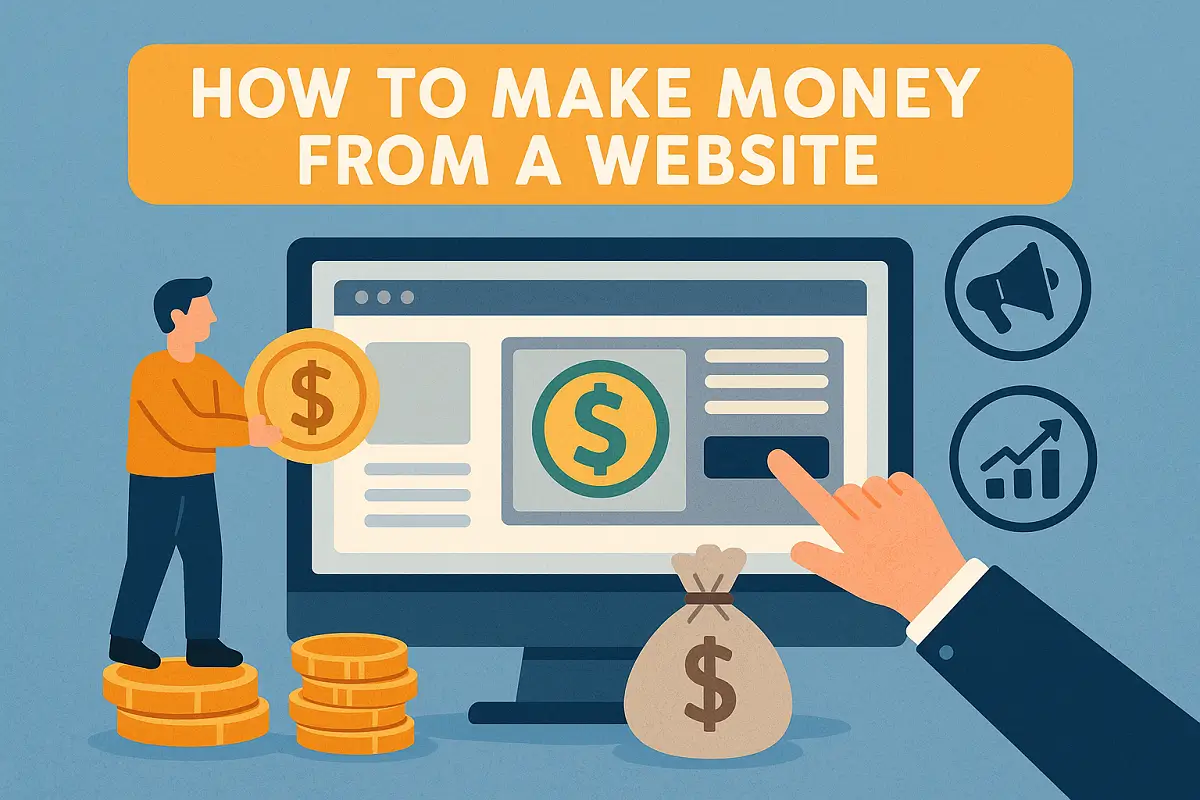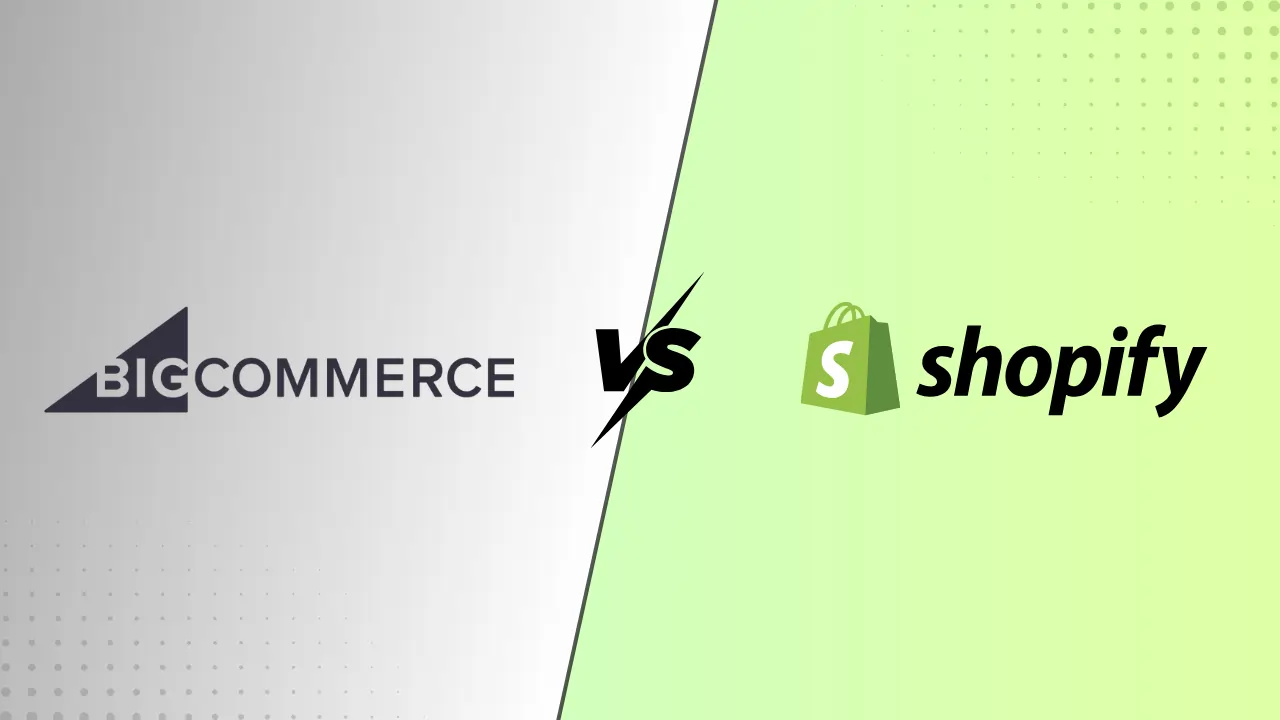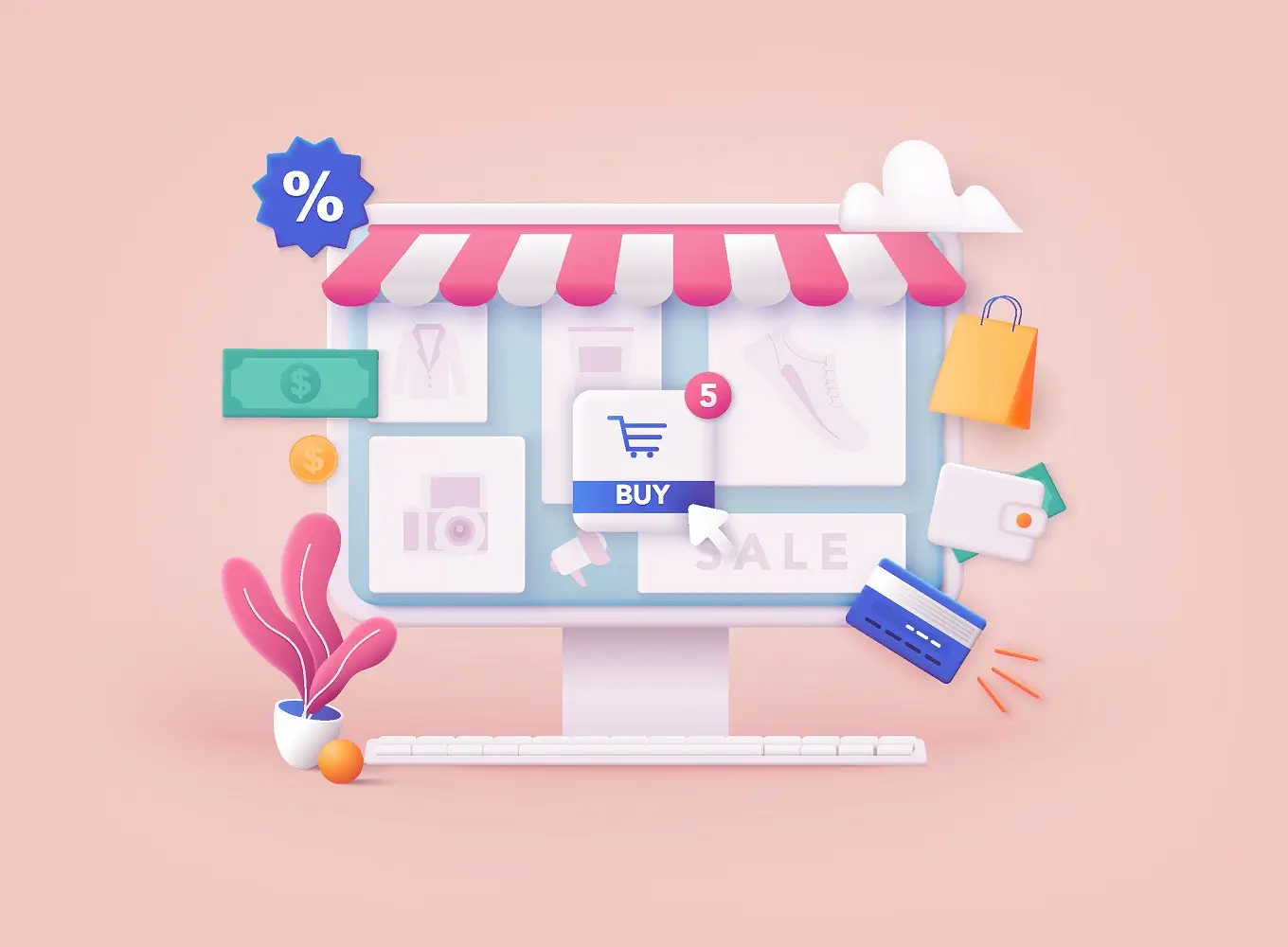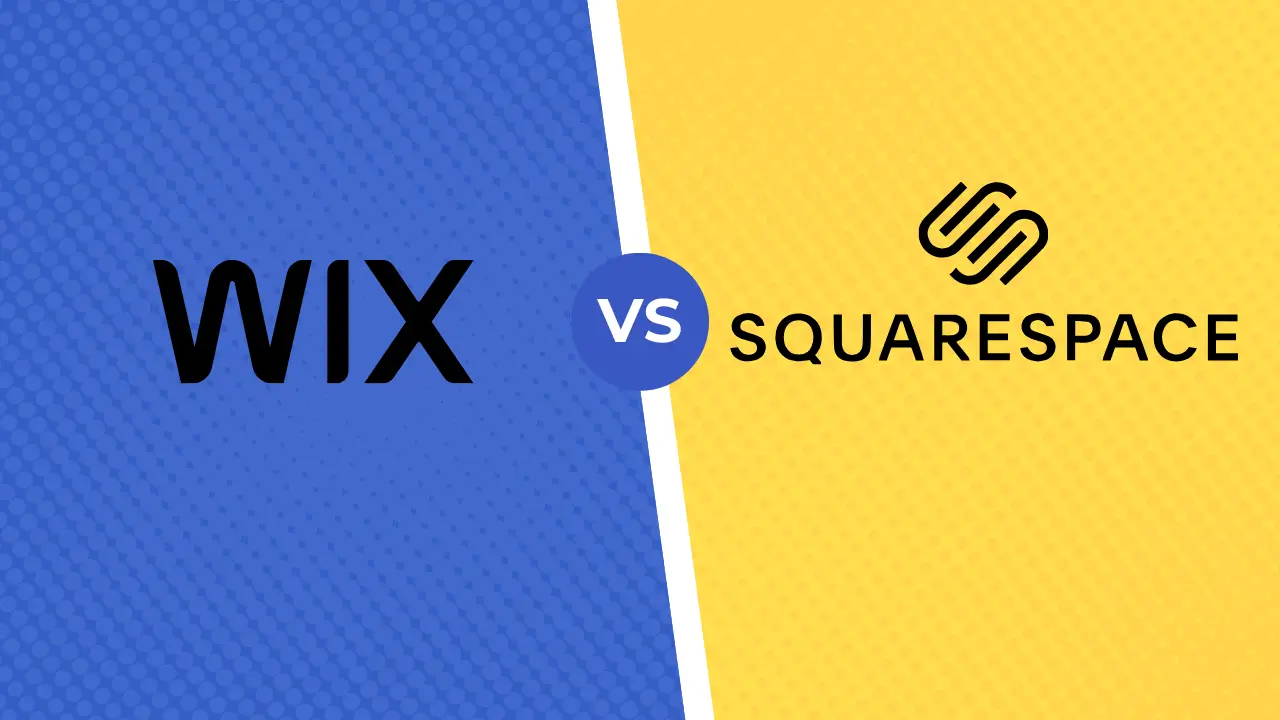Best B2B E-Commerce Platforms for 2025
Last updated: September 2025
A B2B e-commerce platform is a digital solution tailored for business-to-business wholesale transactions. It enhances efficiency and scalability by streamlining the buying and selling process between companies. With features like custom pricing models and robust order management, these platforms facilitate market expansion, optimize operations, and support digital transformation, driving substantial business growth. Let’s compare the top B2B e-commerce platforms and their features to find the right one for your business.
- Dropshipping-friendly
- Social Media & Amazon selling integration
- 100+ designer-made templates
- Trusted by millions of businesses globally
- Drag-and-drop store creator
- Create your online store in minutes
- 3M+ customers choose Web.com
- Sell products on Facebook & Instagram
- SEO tools to boost web traffic fast
- Sign up now and get a FREE domain!*
- Marketing tools and real-time analytics
- Simple payment & order processing
- Boost sales: Create and distribute coupons
- Global sales with 80 different currencies
- Responsive design: Sell from any device
- User-friendly e-commerce site builder
- Accept online payments with 0% commission
- Secure payment & delivery options
- Start free with unlimited product listings
- Built-in SEO tools and Google integrations
- Advanced features: Abandoned cart recovery
- 240+ design templates
- Drag & drop product merchandising
- Built-in SEO tools to boost visibility
- Vast ecosystem of extensions
- Enables limitless customization
- Integrates with any WordPress site
- Single cloud-based platform
- Built-in SEO optimization tools
- 24/7 help and support
Why You Can Trust the Expertise of Sonary
At Sonary, we are committed to providing accurate and trustworthy information to help you make informed decisions. Our research process is meticulous, transparent, and guided by a dedication to maintaining the highest standards of integrity.
Unlike many other review platforms, we conduct in-depth evaluations of the software and services we feature. Our expert team tests and actively uses the tools we review to understand their features, performance, and value comprehensively. Our assessments are based on real-world use, giving you insights beyond surface-level descriptions.
Our research methodology includes analyzing key consumer factors such as pricing, functionality, device usability, scalability, customer support quality, and unique industry-specific features.
This hands-on approach and dedication to transparency mean you can trust Sonary to deliver regular, up-to-date content and recommendations that are well-researched and genuinely helpful for your business needs.
What is a B2B E-Commerce Platform, and What Does it Do?
A B2B e-commerce platform is a powerhouse tool revolutionizing how businesses connect, transact, and grow. These platforms are engineered for the complexities of wholesale transactions and optimized for supply chain efficiency. They transform traditional business operations into dynamic, digital engines.
They offer custom pricing models and seamless integration with Enterprise Resource Planning (ERP) systems, propelling companies into a new era of online procurement and multi-channel selling.
With cutting-edge e-commerce data analytics, you can make smarter, faster decisions, ensuring you’re always a step ahead in the competitive B2B marketplace.
These platforms are crucial in driving the digital transformation in B2B sectors, leading to significant business growth and operational excellence. Ready to turbocharge your business growth? A B2B e-commerce platform is your launchpad!
4 of the Best B2B E-Commerce Platforms
 Trusted by millions of businesses globally
Trusted by millions of businesses globally  Drag-and-drop store creator
Drag-and-drop store creator  Dropshipping-friendly
Dropshipping-friendly  Social Media & Amazon selling integration
Social Media & Amazon selling integration  240+ design templates
240+ design templates  Drag & drop product merchandising
Drag & drop product merchandising  Vast ecosystem of extensions
Vast ecosystem of extensions  Enables limitless customization
Enables limitless customization The right e-commerce platform is crucial for B2B businesses looking to enhance their online presence. From scalable solutions that grow with your needs to platforms that offer comprehensive customization and integration options — selecting the right platform can significantly impact your business success.
For detailed comparisons and to explore which features align with your specific needs, use our comparison tool to weigh the benefits of each platform against your business requirements and budget constraints.

Types of B2B E-Commerce Platforms Available
B2B e-commerce platforms come in various forms tailored to different business needs and industry specifics. Each type is designed to tackle unique challenges, ensuring every business can find a solution that enhances its operational capabilities.
Understanding these subcategories can help you select the perfect platform to fuel your business growth.
- SaaS E-commerce Platforms
These cloud-based solutions offer scalability and flexibility, with providers managing maintenance, updates, and hosting. Ideal if you’re looking for cost-effective, plug-and-play options.
- Open-Source E-commerce Platforms
For companies needing customizable solutions, open-source platforms provide full control over the code. You can tailor every aspect of your e-commerce experience but must handle your own maintenance and security.
- B2B Marketplaces
Platforms like Shopify facilitate transactions between multiple buyers and sellers in a centralized online location, expanding reach and simplifying global trade.
- Vertical B2B Platforms
These industry-specific solutions cater to the unique needs of specific sectors, such as automotive or pharmaceuticals, ensuring that functionalities are precisely aligned with industry standards.
- B2B Wholesale Platforms
Dedicated to wholesale transactions, these platforms support bulk ordering processes, sophisticated pricing strategies, and large-scale order management.
- B2B Procurement Platforms
These platforms streamline purchasing, from requisition to payment, optimizing supply chain operations and integrating directly with business systems for enhanced transparency.
Do I Really Need a B2B E-Commerce Platform?
In today’s fast-paced, digital-first world, the answer is increasingly clear — yes. A B2B e-commerce platform is a critical tool for maintaining competitive advantage and achieving sustainable growth.
The platform supports your ability to sell and grow and adapts to the evolving market demands and consumer expectations, making it an indispensable asset for any B2B enterprise aiming to thrive in the digital era.
Here are some major benefits of investing in a B2B e-commerce solution.
Increased Sales Reach
Extend your market beyond traditional boundaries. An e-commerce platform opens up new geographical areas and markets without the need for physical expansion.
Cost Reduction
By automating sales and administrative processes, businesses can reduce labor costs and minimize errors associated with manual entry.
Enhanced Customer Experience
Digital customer portals and mobile e-commerce capabilities provide a seamless, convenient buying experience, which most business buyers now expect.
Improved Supplier and Partner Relationships
Efficient multi-channel selling and better integration of supply chain management help maintain strong relationships with partners and suppliers, enhancing reliability and trust.
Operational Efficiency
Automation of order processes and integration with ERP systems streamline operations from order to fulfillment, reducing errors and saving time.
Data-Driven Insights
With e-commerce analytics, businesses gain real-time insights into customer behavior, sales trends, and inventory levels, enabling better decision-making.
Scalability
As your business grows, a B2B e-commerce platform can scale with you, supporting increased orders, more complex pricing models, and additional sales channels.
The Average Pricing of B2B E-Commerce Platforms
Investing in a B2B e-commerce platform is a strategic decision that involves understanding the various pricing models available. Pricing can vary widely based on features, scalability, and support services provided. Here’s what you might expect:
Subscription-Based Models (SaaS)
Most SaaS e-commerce platforms operate on a monthly or yearly subscription basis. Prices can range from as low as $8 per month for basic services to over $2000 for enterprise-level solutions with advanced features.
One-Time License Fee
Some platforms, especially customizable open-source ones, may require a one-time purchase price. Depending on the complexity and customization involved, this can range from a few thousand to tens of thousands of dollars.
Transaction Fees
Some platforms charge a fee per transaction or a percentage of the sales, which can add up but typically includes payment processing.
Free Models
There are free versions available, especially among SaaS platforms. These usually offer basic functionalities with limitations on customization, user numbers, or transaction volumes.
Pros of Free Versions:
- Cost-effective: Ideal for small businesses testing the digital waters without a significant initial investment.
- Ease of use: Free versions are generally user-friendly, making them a good starting point for businesses new to e-commerce.
Cons of Free Versions:
- Limited features: Free plans often lack advanced features like custom pricing models, integration with ERP systems, and comprehensive analytics.
- Scalability issues: As your business grows, a free platform may not handle the increased demands, necessitating a paid upgrade.
- Support limitations: Free versions typically come with limited or no customer support, which can be problematic during technical difficulties.
A paid platform is generally recommended for businesses serious about leveraging B2B e-commerce for growth. It provides more comprehensive features, better support, and scalability options necessary for expanding enterprises.

Important B2B E-Commerce Platform Features
To maximize the effectiveness of your platform, you’ll want to understand and leverage its core features. Here are some of the most critical features that top platforms share and tips on using them to drive your business success.
Robust Order Management
- A powerful order management system can handle complex B2B transactions, including bulk, recurring, and custom orders.
- Automate the order-to-cash process to reduce errors and increase efficiency.
Custom Pricing Models
- Different customers might have negotiated different prices, which need to be managed seamlessly.
- Set up tiered pricing structures and personalized discounts to foster loyalty and increase order values.
Multi-Channel Selling
- This feature allows businesses to sell across various channels from a single platform, including online, mobile, and through third-party marketplaces.
- Expand your presence on multiple channels to reach more customers and capture more data on buying behaviors.
Integration with ERP Systems
- Seamless integration with Enterprise Resource Planning (ERP) systems ensures that inventory, accounting, and customer relationship management are all aligned.
- Ensure real-time data synchronization to improve inventory management and customer service.
B2B Payment Systems
- Since B2B transactions often involve larger sums and credit terms, having a secure and flexible payment system is crucial.
- Offer multiple payment options and terms that cater to your client’s needs, enhancing their buying experience.
E-commerce Analytics for B2B
- Analytics help track and analyze buyer behavior, sales trends, and website performance.
- Optimize your marketing strategies and product offerings.
Mobile E-commerce B2B
- With the increasing use of mobile devices in business, having a mobile-optimized platform is essential.
- Offer a seamless mobile experience that caters to on-the-go buyers.
B2B Customer Portals
- These portals allow customers to self-serve for tasks like re-ordering, checking order status, and managing their accounts.
- Enhance the user experience with personalized dashboards and 24/7 access, reducing the need for customer service intervention.
Online Procurement Tools
- Tools that facilitate the entire procurement process can streamline purchasing and approvals.
- Automate procurement processes to save time and reduce procurement costs.
Security Features
- Security is paramount in B2B transactions due to the sensitive information and larger transaction volumes.
- Implement top-tier security measures to protect your platform from breaches, thus building trust with your customers.
By understanding these key features and leveraging them effectively, you can ensure that your B2B e-commerce platform meets the needs of today’s businesses.
How to Choose the Right B2B E-Commerce Platform for You
Selecting the right B2B e-commerce platform is crucial for your business’s success. By following these tips, you can make a well-informed decision on the right platform that meets your current needs and long-term business goals.
- Assess Your Business Needs
Begin by thoroughly understanding your specific business requirements. Consider the size of your business, the volume of transactions, the complexity of your supply chain, and specific features you need, like custom pricing models or advanced analytics. - Evaluate the Scalability
Choose a platform that can grow with your business. Look for solutions that can handle an increasing amount of transactions, expanding product lines, and entry into new markets without performance issues. - Check for Integration Capabilities
Ensure the platform seamlessly integrates with your ERP systems, CRM software, and other technological tools. This integration is vital for maintaining data consistency and streamlining operations across departments. - Consider the User Experience
Both your team and your customers will interact with the platform regularly. Opt for a platform with an intuitive interface that supports mobile e-commerce B2B functionalities to enhance user engagement and satisfaction. - Analyze the Support and Reliability
Reliable customer support is critical, especially in the deployment and maintenance phases. Verify the platform’s uptime records and read reviews about their customer service to ensure you’ll receive assistance whenever needed. - Review Security Features
Given the scale and sensitivity of B2B transactions, robust security measures are non-negotiable. Ensure the platform complies with your industry’s latest security standards and regulations. - Look for Customization Options
Since no two businesses are exactly alike, a platform that allows customization can be a significant advantage. Check if the platform will enable you to modify workflows, integration, and user interfaces to fit your business processes. - Consider the Total Cost of Ownership
Beyond the initial cost, consider ongoing expenses such as maintenance, upgrades, additional modules, and transaction fees. A platform with a transparent pricing model without hidden costs is preferable. - Request Demos and Trials
Before making a final decision, request a demo to see the platform in action. If possible, opt for a trial period to test the platform’s functionalities and ensure it aligns with your business operations and goals. - Leverage Comparison Tools
These tools highlight differences in features, pricing, and user reviews, helping you quickly identify the best fit for your business needs. This approach streamlines the selection process, ensuring an informed decision. - Gather Feedback from Stakeholders
Involve key stakeholders in the decision process, including IT staff, sales teams, and finance departments. Their insights can provide valuable perspectives on the platform’s suitability for your needs.
Tips for Successful Implementation of a B2B E-Commerce Platform
Implementing a B2B e-commerce platform successfully requires strategic planning and careful execution. Here are essential tips to ensure a smooth rollout and maximize the effectiveness of your new system:
Develop a Clear Implementation Plan
Start with a detailed plan that outlines every step of the implementation process, from timeline and budget to resources and milestones. Ensure all stakeholders are on board and understand their roles and responsibilities.
Engage Stakeholders Early
Involve all relevant stakeholders from the beginning, including IT, sales, marketing, customer service, and logistics teams. Their input can help address specific needs and preferences, ensuring the platform supports all aspects of the business.
Choose the Right Implementation Team
Whether it’s an internal team or external consultants, ensure they have experience with B2B e-commerce platforms and understand the nuances of your industry and business processes.
Train Your Team
Provide comprehensive training for all users, tailored to their specific roles. Training should cover daily operations, troubleshooting, and how to leverage the platform for maximum benefit.

Prioritize Data Integrity
Migrate data carefully and verify its accuracy. This includes customer data, product information, pricing models, and historical transactions. Clean and organize data before it goes live to prevent issues post-launch.
Test Thoroughly
Before going live, conduct thorough testing to identify and resolve any technical issues. Test the platform under different scenarios and ensure it integrates seamlessly with other business systems like your ERP and CRM.
Launch in Phases
Consider a phased rollout starting with a pilot program that includes a manageable group of users. This approach allows you to gather feedback and make adjustments before a full-scale launch.
Monitor and Optimize
After launch, continuously monitor the platform’s performance and gather user feedback. Use this information to tweak and optimize the system, improving functionality and user experience.
Establish Support Channels
Set up dedicated support channels to help users with any issues that arise. Quick and effective support is crucial to maintaining productivity and user satisfaction.
Keep Up with Updates
Technology evolves rapidly, and so do business needs. Regularly evaluate and update your platform to take advantage of new features and improvements that enhance efficiency and competitiveness.
What Type of Hardware Is Needed?
Deploying a B2B e-commerce platform doesn’t just involve software considerations — the proper hardware setup is crucial to support the infrastructure efficiently.
When selecting hardware, consider the scale of your operations, budget, and future growth prospects.
It may also be beneficial to consult with IT professionals to ensure your hardware setup optimally supports your platform. This careful planning will contribute significantly to the platform’s stability and performance, enabling your business to deliver a seamless and efficient buying experience.
Here’s a breakdown of the essential hardware components you might need.
Servers
Whether you opt for on-premises hosting or cloud services, having robust servers is crucial. For on-premises solutions, powerful servers are required to handle the processing load and data storage needs. In cloud-based models, the service provider typically manages this, though it’s essential to understand their hardware capabilities to gauge performance and reliability.
Network Infrastructure
Reliable and fast network infrastructure is essential to ensure your e-commerce platform is always accessible and performs well under heavy traffic conditions. This includes sufficient bandwidth, modern routers, and switches that can handle high data volumes.
Data Storage Solutions
Adequate data storage solutions are required to manage large volumes of transaction data, customer information, product details, and multimedia files. Depending on your data management policies, options include on-site hardware storage or cloud-based storage services.
Backup Systems
Robust backup systems are critical to safeguard your data against loss due to hardware failure, cyber-attacks, or other unforeseen events. These might include redundant data storage solutions or specialized backup hardware that regularly saves critical data to a secure location.
Security Hardware
Hardware security modules (HSM), firewalls, and advanced encryption devices play a vital role in protecting sensitive transaction data and preventing unauthorized access to the network.
Workstations
High-performance workstations are needed for the development team to build and maintain the platform and for customer service teams to manage orders and provide support efficiently. These should have adequate processing power, memory, and modern software to smoothly handle multitasking and complex operations.
Mobile Devices
With the increasing importance of mobile e-commerce B2B capabilities, ensuring your team is equipped with modern smartphones and tablets can enhance flexibility and accessibility, allowing for real-time management and monitoring of e-commerce activities.
Point of Sale (POS) Terminals
For businesses that integrate online and offline sales channels, POS terminals that sync with the e-commerce platform can streamline transactions and inventory management across channels.
How Do Different Industries Use B2B E-Commerce Platforms?
B2B e-commerce platforms are versatile tools that adapt to the unique needs of various industries, enabling more efficient operations and enhanced customer service across sectors.
Each industry adapts the core functionalities of the platforms to meet its specific operational, regulatory, and customer service needs.
Fashion and Apparel
- In the fashion industry, B2B platforms support rapid stock rotation and seasonal changes by enabling quick updates to product listings and inventory.
- Benefits: They also facilitate trend analysis and demand forecasting with sophisticated e-commerce analytics tools.
Building and Construction
- Companies in the building and construction industry use B2B e-commerce platforms to handle bulk orders of materials, track deliveries, and manage project-based ordering.
- Benefits: These platforms often feature integration with project management tools.
Food and Beverage
- B2B e-commerce in the food and beverage industry helps manage the supply chain for perishable goods.
- Benefits: They support compliance with food safety regulations and allow for traceability from farm to table.
Manufacturing
- Manufacturers use B2B e-commerce platforms to streamline their supply chain management, automate order processing, and provide a direct sales channel to distributors and retailers.
- Benefits: This reduces the overhead costs associated with traditional sales channels and speeds up product time-to-market.
Wholesale and Distribution
- Wholesalers and distributors use the platforms to manage large order volumes, complex pricing models, and inventory across multiple locations.
- Benefits: These platforms facilitate bulk orders, track inventory in real time, and integrate with logistics solutions to streamline deliveries.
Technology and Electronics
- In this rapidly evolving sector, B2B platforms help companies manage frequent changes in product offerings and specifications.
- Benefits: Features like custom pricing models and multi-channel selling allow for dynamic pricing and promotions, which are crucial for staying competitive.
Pharmaceuticals and Healthcare
- Compliance with stringent regulatory requirements is crucial for the pharmaceutical and healthcare industries. B2B e-commerce platforms in these sectors are designed to handle sensitive information securely.
- Benefits: Specific functionalities for tracking lot numbers, managing expiry dates, and ensuring compliance with health regulations.
Automotive
- Automotive businesses use B2B e-commerce platforms to manage complex supply chains that involve numerous parts suppliers.
- Benefits: Platforms help automate the procurement and distribution processes, facilitate real-time updates, and enable efficient aftermarket sales and service.

Chemicals
- Chemical industries require B2B e-commerce platforms that provide detailed product information and handle hazardous materials compliance.
- Benefits: They support complex logistical requirements, including special handling and storage.
Which Personas Use B2B E-Commerce Platforms?
Understanding the personas that interact with B2B e-commerce platforms can provide insights into how to tailor the platform to meet diverse needs. Each uses the platform differently, yet all depend on its ability to streamline operations, provide vital business intelligence, and enhance customer interactions.
Tailoring the platform to accommodate the needs of these varied users can dramatically increase its effectiveness and the satisfaction of its primary stakeholders.
C-Level Executives
- CEOs, CTOs, CFOs, and other top executives use B2B e-commerce platforms to understand overall business performance and make strategic decisions.
- Focus: They are interested in dashboards that provide a holistic business view, integrating data from sales, customer service, and supply chains.
Procurement Managers
- These individuals are responsible for purchasing products and services for their companies. They rely on features like online procurement, order tracking, and managing relationships with suppliers.
- Focus: They value platforms that offer detailed product information and streamlined purchasing processes.
Supply Chain Executives
- These professionals oversee the end-to-end supply chain operations. They use the platforms to improve supply chain efficiency through better inventory management and integration with logistics services.
- Focus: Platforms that provide real-time analytics and visibility across the supply chain are crucial for them.
Finance Officers
- Financial professionals use B2B e-commerce platforms to manage billing, invoicing, and payment processing.
- Focus: They need reliable B2B payment systems and features to automate and streamline financial transactions and reporting.
IT Administrators
- IT admins manage the technical aspects of e-commerce platforms, ensuring they integrate smoothly with existing systems, like ERP and CRM, and maintain high levels of performance and security.
- Focus: Platforms that are customizable, scalable, and secure.
Sales and Marketing Professionals
- Use B2B e-commerce platforms to reach new customers, manage sales campaigns, and analyze market trends.
- Focus: Features like multi-channel selling, customer segmentation, and advanced analytics that help tailor marketing strategies.
Customer Service Representatives
- Handle customer inquiries, complaints, and after-sales service. B2B e-commerce platforms with customer portals and CRM integration help them provide better service.
- Focus: Access to comprehensive customer data and order histories.
Business Analysts
- Analysts rely on the data generated by B2B e-commerce platforms to forecast trends, optimize operations, and improve decision-making.
- Focus: They need robust analytics and reporting tools to provide deep insights into business performance.
Products Related to B2B E-Commerce Platforms
A successful B2B e-commerce operation involves more than just the platform itself — it requires a suite of related products and services that enhance functionality and improve overall efficiency. By integrating them, businesses can create a comprehensive, efficient, and responsive e-commerce ecosystem that supports all aspects of digital commerce and customer interaction.
Customer Relationship Management (CRM) Systems
CRM systems are essential for managing customer information, sales activities, and marketing campaigns. Integration with a B2B e-commerce platform allows seamless data flow between sales and online channels, enhancing customer engagement and personalization.
Bookkeeping Software
Bookkeeping software is indispensable for accurately tracking financial transactions, managing budgets, and ensuring compliance in B2B operations. Integration can automate the recording of sales, streamline tax calculations, and provide real-time financial insights.
Enterprise Resource Planning (ERP) Systems
ERP integration is crucial for automating business processes and centralizing data management. It helps synchronize inventory, financials, and customer orders between the e-commerce platform and back-office systems, providing a unified view of business operations.
Payment Processing Solutions
Reliable and secure merchant service providers are essential for handling transactions, especially in B2B environments where transactions can be large and often involve credit terms. Integration with e-commerce platforms ensures transactions are smooth and secure.
Inventory Management Software
Crucial for optimizing stock levels, inventory management software syncs with B2B e-commerce platforms to track product availability, manage reordering, and prevent overstocking, ensuring efficient operations and customer satisfaction.
Supply Chain Management (SCM) Software
SCM software optimizes the flow of goods and services from manufacturing to sale. It enhances the capabilities of an e-commerce platform by ensuring efficient logistics, inventory management, and order fulfillment.
Product Information Management (PIM) Systems
PIM systems manage product data from multiple sources, ensuring accuracy and consistency across all sales channels. This is particularly vital for B2B platforms with extensive product catalogs and specifications.
Data Analytics and Business Intelligence Tools
These tools analyze data collected from e-commerce activities to provide insights into customer behavior, market trends, and business performance. Effective use of analytics can drive strategic decision-making and improve operational efficiencies.
Content Management Systems (CMS)
A CMS helps create and manage digital content on B2B e-commerce sites. It’s crucial for maintaining up-to-date product descriptions, blogs, and educational material, which can enhance SEO and user engagement.
Cybersecurity Solutions
Given the scale of transactions and the sensitivity of data handled in B2B e-commerce, robust cybersecurity solutions are necessary to protect against data breaches and cyber threats.
Mobile Application Development Platforms (MADP)
As B2B mobile e-commerce grows, MADPs enable businesses to build and manage mobile apps that enhance customer interaction and accessibility.
E-commerce Customer Service Tools
Tools like live chat, AI-driven chatbots, and ticketing systems help promptly manage customer queries and issues, improving overall customer satisfaction and retention.
Final Thoughts
Choosing the right B2B e-commerce platform can be a game-changer for your business. It streamlines operations, boosts customer satisfaction, and drives sales.
Leveraging a comparison tool enables you to see and compare features and pricing structures, simplifying the decision-making process.
Whether you’re just starting out or looking to enhance your current setup, investing in a B2B e-commerce solution is a smart move towards a brighter, more connected future for your business.
Let’s not just do business — let’s revolutionize it. Pick your B2B e-commerce platform and lead the charge into the digital dawn.
FAQs
Q: What is a B2B e-commerce platform?
A: A B2B e-commerce platform is a digital solution that facilitates online transactions between businesses, streamlining processes like ordering, billing, and customer management.
Q: Why should I use a B2B e-commerce platform?
A: Utilizing a B2B e-commerce platform can enhance your operational efficiency, expand your market reach, improve customer relationships, and provide valuable insights through data analytics.
Q: How do I choose the right B2B e-commerce platform for my business?
A: Assess your business needs, consider scalability, ensure compatibility with existing systems, evaluate user experience, and understand the total cost of ownership before choosing a platform.
Q: What are some essential features of a B2B e-commerce platform?
A: Key features include robust order management, custom pricing models, multi-channel selling, ERP integration, advanced security measures, and mobile functionality.















